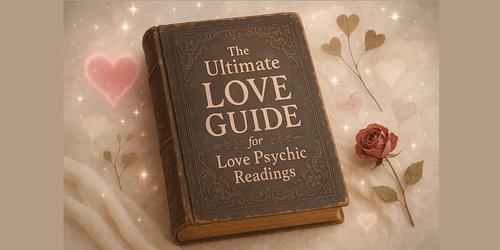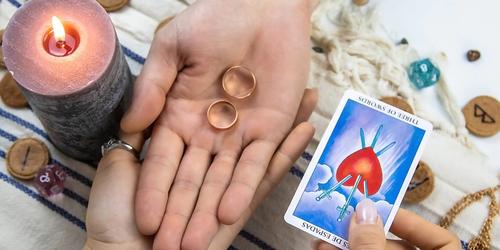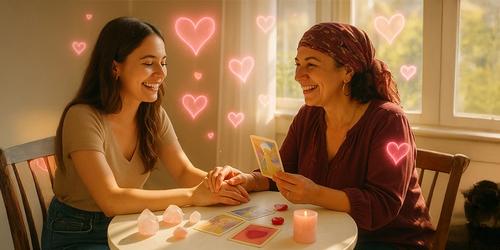
To pay for your reading on your telephone bill, simply call
Instantly message our featured psychics online via psychic messenger.
Click to start
Register now to start your reading online. PSYCHIC MESSENGER- Cheapest psychic service in the UK
- Our readers are available 24/7
- 100% confidential service
- In-depth, concise, personal readings
- Thousands of 5* reviews
Published 25/02/2024 • Updated 11/04/2024 by Joanne Jones
Lust vs Love
Love vs lust are two powerful emotions that often get intertwined, but it is crucial to understand their key differences. Love and lust both involve intense feelings and a strong desire for someone.
The difference between lust and love is that love goes beyond the physical connection and focuses on emotional attachment and long-term commitment. Feelings of lust primarily revolve around sexual attraction and immediate gratification.
Physical attraction is essential in any romantic partnership, short-term and long-term relationships, as it helps build deeper connections. It involves being drawn to someone based on their appearance, mannerisms, or physical presence.
Lust heavily relies on this initial spark of sexual attraction as its foundation. It is a powerful force that ignites intense desire and creates an irresistible urge to indulge in sexual activities with the object of one's desire.
Love vs Lust
Love vs lust are two distinct emotions that often get confused. Lust is driven by immediate sexual desire and focuses on attraction and gratification.
Love is an intense emotion that stretches beyond physicality and involves emotional connection, understanding, and long-term commitment. While both can coexist in a healthy relationship, love provides a deeper bond and lasting fulfilment.
It is essential to differentiate between love and lust to build strong and meaningful relationships based on genuine connection rather than fleeting desires.
Understanding Love and Lust
A healthy relationship requires both intimate attraction and emotional connection. The ideal scenario involves finding a balance between lust and love. This means being physically attracted to your partner while forming a strong emotional bond.
When love is present in a relationship, the sexual aspect becomes more meaningful. Physical intimacy becomes an expression of the emotional connection between two people rather than just a means for gratification. Love adds depth and meaning to the physical aspect of a relationship, making it more fulfilling and satisfying.
Defining Love
Love, unlike lust, delves deeper into emotional intimacy and connection. It involves developing a profound understanding and acceptance of one another's flaws and vulnerabilities.
Love allows individuals to form a bond beyond the physical realm, creating a sense of security and trust in the relationship.
In a loving relationship, there is a genuine desire to connect with the other person on a deeper level. This deeper relationship involves open communication, shared values, and mutual respect. The focus shifts from solely satisfying one's desires to supporting and nurturing the other person's well-being.
Unveiling Lust
Love vs lust, lustful relationships tend to be more short-lived and lack the depth and commitment that a loving relationship entails.
Lust is often driven by immediate gratification without considering the long-term consequences or emotional attachment. It is more focused on the physical aspects of a relationship, such as sexual pleasure, and may lack the emotional connection and intimacy that love provides.
While lust can be exciting and intense, it is essential to recognise that it is not a solid foundation for a long-lasting and meaningful relationship. Lustful feelings may come and go, while love is enduring and rooted in deep affection.
The Intersection of Love and Lust
Love vs lust are two fundamental yet distinct emotions that often intertwine in romantic relationships, shaping the dynamics of intimacy, desire, and commitment.
Understanding the differences between love vs lust is essential for navigating the complexities of modern-day relationships and making genuine connections that endure the tests of time.
Love and Lust: A Complex Duo
Love and lust often coexist in romantic relationships, creating a complex relationship dynamic that shapes the overall connection between partners.
While love encompasses deep emotional intimacy, trust, and commitment, lust is characterised by intense intimate attraction and desire. This duality allows couples to experience various emotions and desires, contributing to the depth and richness of their relationship.
Love provides a foundation of emotional support, understanding, and companionship, while lust adds an element of excitement, passion, and physical chemistry. The interplay between love and lust fosters a sense of balance and vitality in the relationship, allowing partners to experience emotional fulfilment and physical satisfaction.
When Love Is Dominant
In situations where love takes precedence in a love vs lust scenario, partners prioritise emotional intimacy, companionship, and long-term commitment over sexual attractiveness.
Love becomes the driving force behind the relationship, creating understanding and mutual respect between partners. These relationships are characterised by a strong foundation of trust, empathy, and shared values, where partners prioritise each other's well-being and happiness above all else.
Love dominates the relationship, leading couples to prioritise emotional connection, support, and growth. Physical intimacy is seen as an expression of the deeper emotional bond rather than the primary focus.
When Lust Takes the Lead
Love vs lust - In situations where lust takes the lead in a romantic connection, the primary driving force is intense sexual attractiveness and desire, often overshadowing deeper emotional bonds.
These relationships may be characterised by a strong initial spark of passion and excitement created by physical chemistry and sexual attraction. Partners may prioritise gratification and thrill-seeking behaviours, seeking immediate pleasure without necessarily investing in emotional intimacy or long-term commitment.
Lust-driven relationships may involve a focus on physical appearance, sexual compatibility, and excitement, with partners pursuing thrill-seeking activities and prioritising sexual gratification over emotional connection. However, without a strong foundation of emotional intimacy and mutual respect, relationships, where lust takes the lead, may be more prone to instability and dissatisfaction as the initial excitement of intimate attraction fades over time.
The Science of Love
The science of love encompasses a multidisciplinary approach that explores the psychological, neurological, and physiological aspects of romantic attachment and emotional bonding.
Psychologically, love is understood through the attachment theory, which examines how early life experiences shape individuals' attachment styles and influence their adult relationships.
Neurologically, love involves intricate interactions between various brain regions and neurotransmitters, including releasing hormones like oxytocin and dopamine, which play crucial roles in bonding, pleasure, and reward.
Physiologically, love can be measured through physiological responses like increased heart rate, sweating, and pupil dilation when individuals experience feelings of attraction or emotional connection.
The Science of Lust
The science of lust delves into the physiological and psychological mechanisms underlying sexual attraction and desire.
At its core, lust involves intense physical craving and arousal driven by biological and psychological factors.
From a physiological perspective, sexual attraction triggers a cascade of hormonal responses, including increased levels of testosterone and oestrogen, which stimulate libido and enhance arousal.
Neurotransmitters such as dopamine, serotonin, and norepinephrine play key roles in the brain's reward system, reinforcing pleasurable sensations associated with sexual desire.
Psychologically, lust is influenced by factors such as personal preferences, cultural norms, and past experiences, shaping individuals' perceptions of attractiveness and sexual desire.
By understanding the science of lust, researchers aim to unravel the complex interplay of biological and psychological factors that contribute to sexual attraction and desire.
Love vs. Lust in Different Phases of Life
Love and lust evolve and manifest differently across various phases of life. In youth, particularly during adolescence and young adulthood, experiences of love and lust may be characterised by strong feelings of intense passion and exploration.
Physical attraction and sexual desire often play a prominent role, fuelling the excitement and thrill of new romantic connections.
As individuals enter adulthood and mature, the dynamics of love and lust in relationships tend to evolve. While sexual attractiveness and desire remain essential, there is often a greater emphasis on emotional intimacy, trust, and mutual respect.
In later stages of life, such as middle age and beyond, the balance between the tender feelings of love and lust in relationships may continue to shift. Eroticism and sexual desire may wane with age, but emotional intimacy and companionship often become more pronounced.
Love and Lust in Early Relationships
In early relationships, love vs lust often creates a whirlwind of passion and excitement. Intense attraction and sexual desire play prominent roles, fuelling the initial spark of romance and driving couples to explore their compatibility and chemistry.
However, amidst the powerful feeling of new love, emotional intimacy and deeper connection may take time to develop as partners navigate the intensity of physical bonds and the thrill of exploring their desires together.
Long-Term Love and the Evolution of Lust
As relationships mature, long-term love undergoes a transformation, marked by the deepening of emotional bonds and the evolution of lust.
While physical attractiveness remains important, partners in long-term relationships often prioritise emotional intimacy, trust, and companionship over purely physical gratification.
Lust may take on a subtler form, intertwined with feelings of familiarity, comfort, and mutual respect. Couples in long-term love navigate the ebbs and flows of desire, finding fulfilment in the depth and richness of their emotional bond.
Navigating Love and Lust in Modern Relationships
Navigating love vs lust in modern relationships presents unique challenges and opportunities shaped by societal norms, technological advancements, and shifting cultural attitudes towards intimacy and sexuality.
In a hyperconnected world, where social media and dating apps offer endless opportunities for meeting new people and exploring romantic connections, couples must navigate a landscape fraught with temptation and distraction. Balancing love vs lust requires open communication, trust, and a commitment to nurturing emotional intimacy amidst the allure of instant gratification and fleeting encounters.
Balancing Love and Lust
Finding the delicate balance between love vs lust is essential for fostering healthy, fulfilling relationships that endure the test of time.
While love provides a foundation of emotional intimacy, trust, and companionship, lust adds an element of excitement, passion, and physical attraction. Couples must actively work to maintain this equilibrium, prioritising both emotional bonds and sexual desire in an intimate relationship.
Communication and Honesty
Effective and clear communication, mutual respect, and a willingness to explore each other's desires and boundaries are key to navigating the complexities of love vs lust and fostering a harmonious and fulfilling partnership.
The Impact of Love and Lust on Relationships
Love vs. lust's impact on relationships is profound, shaping the dynamics, satisfaction, and longevity of partnerships. While lust can ignite passion and excitement in relationships, building a lasting partnership requires a foundation of love, trust, and emotional connection that transcends the fleeting allure of physical attraction alone.
Building Lasting Love
Building lasting love requires a foundation of emotional intimacy, trust, and mutual respect, nurtured through open communication, shared experiences, and mutual support.
Love fosters a deep sense of connection and commitment between partners, anchoring the relationship in a bond that withstands the tests of time. Couples who prioritise emotions over purely physical attraction often experience greater relationship satisfaction and stability as they navigate life's challenges together with a sense of unity and shared purpose.
The Risks of Lust Alone
The risks of prioritising lust alone in relationships can be significant, potentially leading to dissatisfaction, instability, and emotional turmoil.
When lust takes precedence over love, relationships may become shallow and transient, characterised by a focus on physical attraction and gratification rather than emotional intimacy and mutual respect.
Partners who prioritise immediate pleasure over long-term compatibility may be caught in cycles of infatuation and disillusionment as the initial excitement of physical attraction fades and deeper emotional needs remain unfulfilled.
Love Readings
Love readings from the experts at Trusted Psychics offer a unique opportunity to investigate the dynamics of your relationship from a spiritual perspective and gain insights into whether it is rooted in genuine love or driven by lust.
Trusted Psychics UK's experienced psychics can help you uncover the signs you are in love or indicate whether your connection is based on physical attraction and desire.
Through personalised readings conducted by live psychic readers via phone calls or their online psychic service, Live Messenger, you can receive guidance and clarity on the true nature of your relationship and understand your feelings and motivations.
Whether you're seeking reassurance about the strength of your bond or insights into areas for growth and improvement, the relationship experts at Trusted Psychics offer valuable support and guidance with professional relationship therapists for your journey towards a fulfilling and authentic connection.
FAQs
How Do I Know If It’s Love or Lust?
Determining whether the feelings in your relationship stem from love or lust can be a tricky process that requires introspection and reflection.
Love is often characterised by deep emotional bonds, trust, and mutual respect, while lust tends to focus more on physical attraction and gratification.
Consider the quality of your interactions with your partner—are they based on genuine understanding, support, and companionship, or do intense physical desire and excitement primarily drive them? Additionally, examine the longevity and stability of your feelings—do they withstand challenges and evolve, or do they fluctuate based on external factors and immediate gratification?
By assessing the depth and nature of your emotions and the balance between emotional intimacy and physical attraction in your relationship, you can clarify whether your romantic attraction is rooted in love, lust, or a combination of both.
What Is Powerful Love or Lust?
Determining which is more powerful between love vs lust is difficult, as both emotions significantly influence individuals and relationships. While lust may hold immense power over individuals at the moment, its influence may be briefer and weaker than love's enduring impact.
Can You Be in Love and Still Lust?
Yes, it is entirely possible to be in love and still experience feelings of lust towards one's romantic partner. Love and lust are not mutually exclusive; they often coexist and complement each other in romantic relationships.
Couples can experience a fulfilling and dynamic relationship that satisfies their emotional and physical needs when love and lust coexist harmoniously.
What Comes First, Love or Lust?
As humans, our initial attraction tends to be the attraction to a person's appearance; individuals may feel an immediate physical attraction or intense desire towards someone, which may initially manifest as lust.
This initial spark of physical attraction can catalyse further exploration and development of deeper emotional connections, eventually leading to love.
Contact Trusted Psychics to discover the signs you are in love with top psychics in the UK.
How To Contact A Trusted Psychic
Phone a live Psychic 24 hours a day
View all our live phone psychic and tarot readers online.
View All Live readersMessage a live Psychic 24 hours a day:
View all our live messenger psychic and tarot readers online.
launch messengerRecent Articles From the Trusted Psychics Blog

Psychic Love Readings: What They Reveal About Your Relationship
Discover with Trusted Psychics what psychic love readings are and what they reveal about your relationships, from new to existing relationships & ex-partners.

What Is a Psychic Love Reading? The Ultimate Love Guide
Explore our ultimate love guide on psychic love readings & how they can help you with finding your twin flame, soulmate, new love, & whether an ex will return.

The Ultimate Guide to Finding Your Soulmate Through Tarot
Here's the ultimate guide to finding your soulmate through Tarot. Find out what The Lovers, 2 of Cups & 4 of Wands Tarot cards mean for finding your soulmate.

7 Soulmate Myths Unveiled Video
In this video, Trusted Psychics breaks down 7 of the biggest soulmate myths that could be blocking real love & your soulmate connection from entering your life.

Why Choose a Psychic Love Reading?
Why choose a psychic love reading? They offer more than just yes/no responses; a gifted love psychic can interpret your partner’s feelings and his intentions.

The Power of Love Readings Video
Feeling lost in love? This video breaks down what a love psychic reading really is, how it works, and why so many people turn to psychics for love issues.

